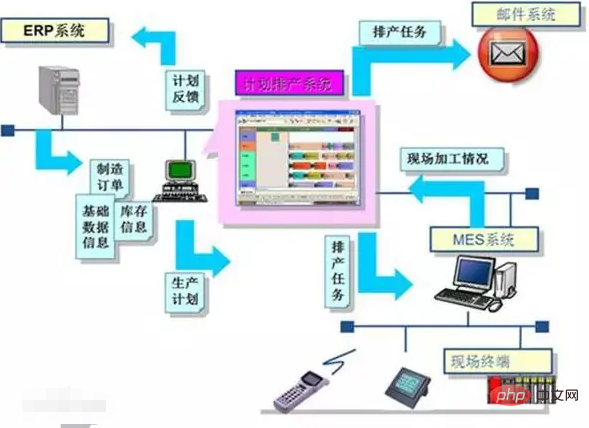Home >Common Problem >What is the core concept of aps system
What is the core concept of aps system
- WBOYWBOYWBOYWBOYWBOYWBOYWBOYWBOYWBOYWBOYWBOYWBOYWBOriginal
- 2022-07-21 14:45:1813360browse
The core concept of aps system is scheduling; aps system refers to advanced planning and scheduling. Scheduling refers to sorting and deciding what to do first and what to do next. This system is to solve the problem of production Scheduling and production scheduling problems solve critical chain and cost-time minimization for project management and project manufacturing by simultaneously solving sequence and scheduling optimization problems for process and discrete hybrid models.

The operating environment of this tutorial: Windows 10 system, DELL G3 computer.
What is the core concept of aps system
APS (Advanced Planning and Scheduling) Advanced Planning and Scheduling
The concept and name are relatively abstract , talk about understanding:
The core concept of APS is scheduling
What is scheduling? In fact, it is sorting, which is deciding what to do first and what to do later. question. In an actual factory, there may be hundreds of pieces of equipment, hundreds of people, a variety of tasks, and various resource constraints (such as equipment capabilities, personnel, time, materials). How to design and schedule to minimize the cost of the enterprise , and can deliver goods on schedule to meet customer requirements, this is what scheduling needs to do.
APS Advanced Planning and Scheduling solves production scheduling and production scheduling problems, often called sequencing problems or resource allocation problems.
In the discrete industry, APS is to solve the optimal scheduling problem of multiple processes and multiple resources; in the process industry, APS is to solve the sequence optimization problem. It simultaneously solves sequence and scheduling optimization problems for process and discrete hybrid models, thereby having great significance for project management and project manufacturing to solve critical chain and cost-time minimization.

#The core of APS is the optimization algorithm, which has gone through four generations. The latest fourth generation is an intelligent algorithm that integrates artificial intelligence dynamic adjustment algorithms. Intelligent algorithms are used for static scheduling, and multi-Agent negotiation is used for dynamic adjustment of distributed calculations. So far, plan management with MPS and MRP calculations as the core ideas has become the standard and core function of modern enterprise ERP. However, judging from the application effects of decades, it is still difficult to meet the plan management needs of enterprises. In fact, the systems and methods of MPS master production planning and MRP material requirements planning have been difficult to adapt to the on-demand production environment, especially the Industry 4.0 era of large-scale personalized customization. APS can comprehensively consider constraints such as production capacity, tooling, and processing batches, and can be combined with MES to achieve rolling production scheduling. This also explains why, in the era of Industry 4.0, MES and APS systems have become much more dazzling stars than ERP.
APS is divided into two categories: supply chain level APS and factory level APS. The Manufacturing Execution System (MES) was initially used to control workshops, manage work centers, and issue work orders. It mainly relied on manual reporting of progress and work hours. With the leanness of manufacturing and the digitization of manufacturing, the MES Manufacturing Execution System was formed. Therefore, the two have overlapping functions in intelligent production scheduling. As an advanced planning and scheduling system representing today's advanced management ideas, the core of APS is a well-honed mathematical algorithm or solution. In the digital economy, the development of APS is showing a diversified trend. One is to be more closely integrated with ERP and MES.
For more related knowledge, please visit the FAQ column!
The above is the detailed content of What is the core concept of aps system. For more information, please follow other related articles on the PHP Chinese website!

